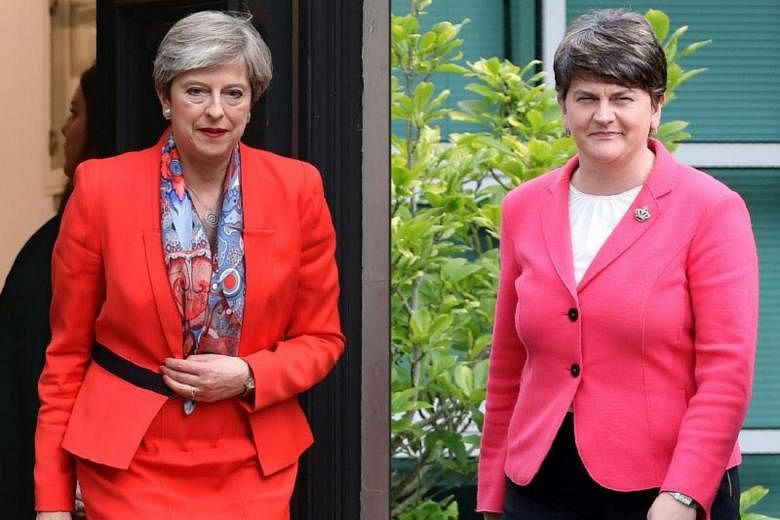LONDON (Reuters, Bloomberg) - Talks between Northern Ireland's Democratic Unionist Party and Prime Minister Theresa May's Conservatives on supporting the British leader's minority government restarted on Wednesday (June 14), a senior Conservative source said.
May and DUP leader Arlene Foster held more than an hour of talks on Tuesday (June 13), after which Foster said an agreement, which is expected to be more informal than a coalition, could be done "sooner rather than later".
May lost her parliamentary majority in last week's election and needs the support of the DUP's 10 lawmakers to pass key legislation.
However, a deal could be delayed until next week after a fire in an apartment block in central London killed several people on Wednesday, the BBC reported.
Media had reported a deal, which would see the DUP support May's minority government, was on course to be announced on Wednesday. The BBC said that would now not happen, a delay which could possibly postpone Brexit talks due to begin next week.
"Deal between DUP and government could be delayed until next week because of aftermath of #grenfelltower and diary commitments of both leaders," BBC political reporter Norman Smith said on Twitter. "Sources say delay over government deal with DUP not because talks are 'stuttering' - 95 per cent agreed between both sides."
May is under growing pressure to abandon her plan for a hard Brexit as she tries to stitch together a deal that will keep the Conservative Party in power.
Two former Tory prime ministers broke cover on Monday (June 12) to demand that May reassess her approach to leaving the European Union after she lost her parliamentary majority in last week's election.
David Cameron and John Major both urged May to collaborate with rival parties on shaping the UK's departure from the European Union because she failed to win a mandate for a hard Brexit. Their separate interventions came as France and Germany told Britain the door is still open to reversing its decision to leave.
"It's going to be difficult, there's no doubt about that, but perhaps an opportunity to consult more widely with the other parties on how best we can achieve it," Cameron told a business conference in Poland, according to a report in the Financial Times. "I think there will be pressure for a softer Brexit," he said.
His comments emerged within hours of Major telling May to listen more to people who opposed leaving the EU. "A hard Brexit was not endorsed by the electorate," Major told BBC Radio.
On Wednesday, the longest-serving lawmaker in the House of Commons and most prominent Tory advocate of the EU, former Chancellor of the Exchequer Kenneth Clarke, backed the calls for a new approach.
"I don't remember a political situation like it," Clarke told BBC Radio 4. "The national interest calls for a cross-party approach."
Cameron and Major are close allies and in the past have coordinated their interventions in UK politics. Cameron - who resigned after losing the Brexit referendum last year, and was replaced by May - worked for Major's government when he was a young adviser before being elected to Parliament in the 1990s.
They are the two most senior Conservatives to urge May to change course on Brexit after last week's disastrous election result for the party. She called a snap vote in an attempt to win a bigger majority and strengthen her position before embarking on Brexit talks.
Instead, she lost her majority in a surprise result that saw her Labour opponents win seats. The comments from the two former premiers will embolden those Tory ministers who are privately plotting to soften May's stance on Brexit, potentially even allowing the UK to stay in the single market and customs union.
Brexit negotiations are due to begin next week.
In Paris on Tuesday, May met French President Emmanuel Macron, who echoed German Finance Minister Wolfgang Schaeuble's comments earlier in the day that it's not too late for the UK to change its mind and stay in the EU.
"The British government has said we will stay with the Brexit," Schaeuble said in a Bloomberg interview. "But if they wanted to change their decision, of course, they would find open doors."

